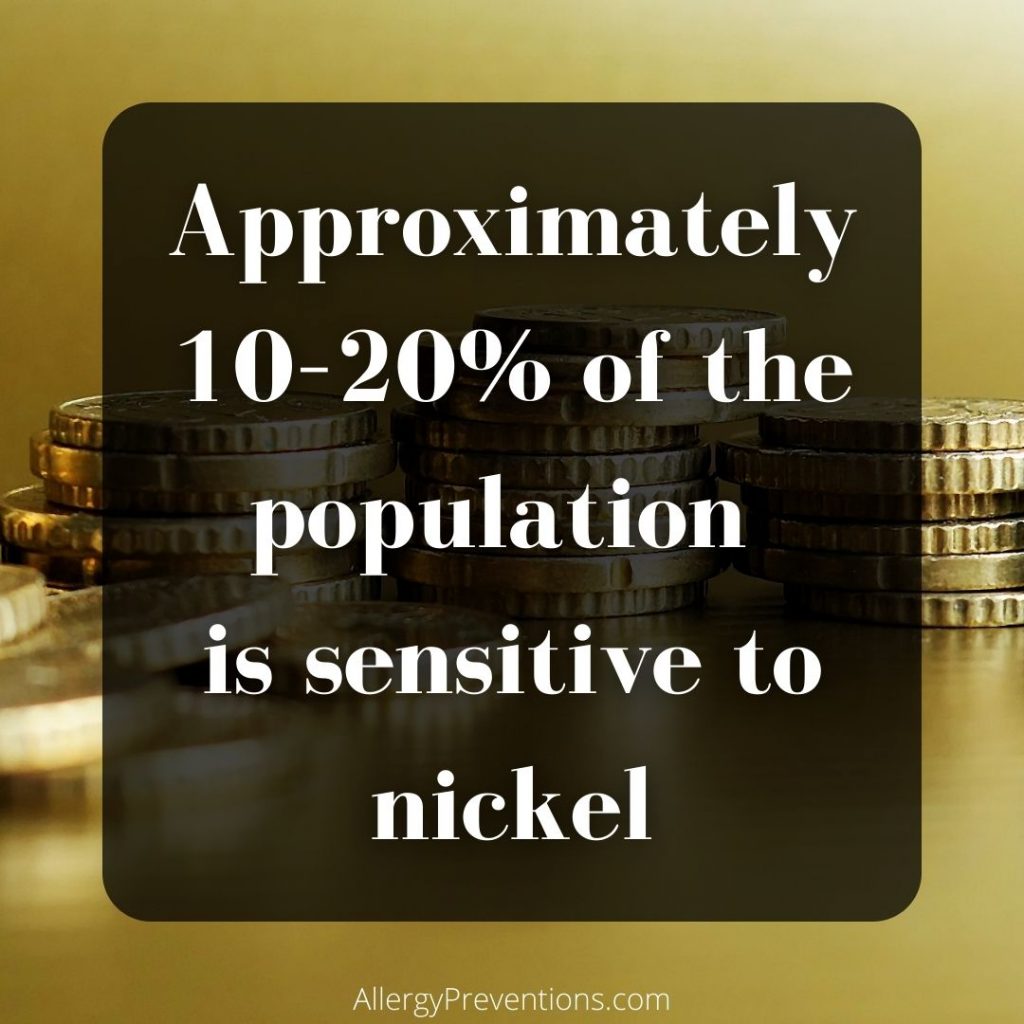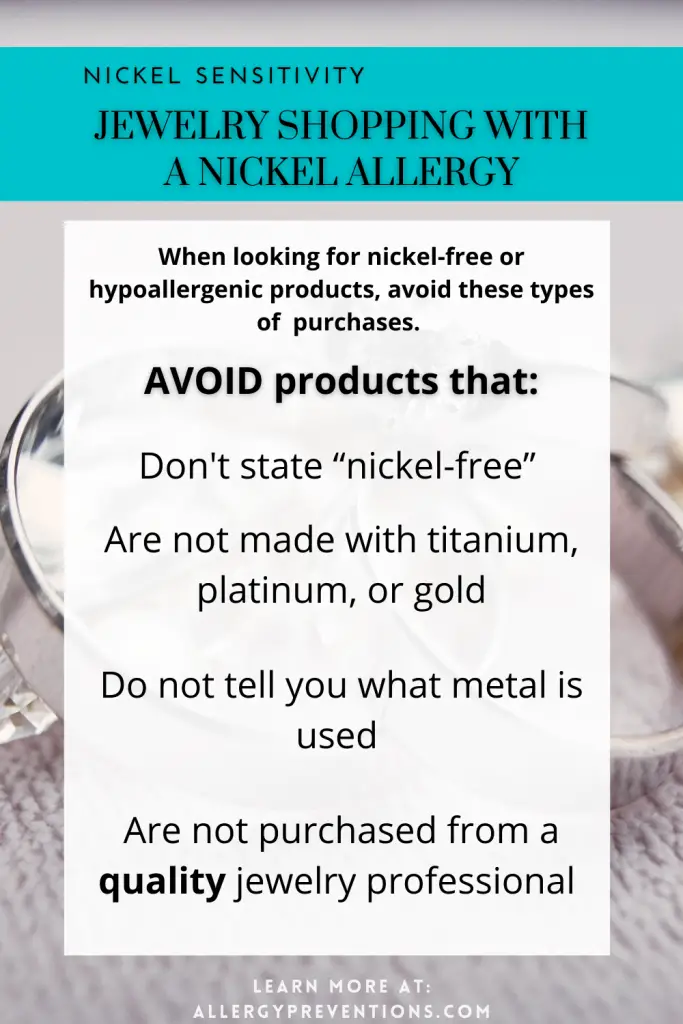No, “hypoallergenic” does not necessarily mean “nickel free.” Nickel is a common metal found in jewelry and other products. It is used because it is strong and resistant to rust and corrosion. However, some people are allergic to nickel and can experience skin irritation when they come into contact with it.
If you are allergic to nickel, you should look for jewelry that is labeled specifically “nickel free”.

FACT: The most common harmful health effect of nickel in humans is an allergic reaction. Approximately 10–20% of the population is sensitive to nickel. (source CDC.gov )
Table of Contents
What does hypoallergenic mean?
There is some debate on what exactly “hypoallergenic” means. Some people believe that it means the absence of any allergens, while others believe that it simply refers to a low level of allergens. Either way, when it comes to jewelry, “hypoallergenic” generally means that the jewelry is unlikely to cause a reaction.
No regulated definition
The U.S. Food and Drug Administration (FDA) has stated that there are no federal standards or definitions for the term “hypoallergenic”. Additionally, the FDA points out, “The term “hypoallergenic” may have considerable market value in promoting cosmetic products to consumers on a retail basis, but dermatologists say it has very little meaning.”
Long story short, there may or may not be some truth behind company claims of their products being “hypoallergenic”.
Why is nickel used in jewelry?
Nickel is used in jewelry because it is strong and resistant to rust and corrosion. However, some people are allergic to nickel and can experience skin irritation when they come into contact with it. If you are allergic to nickel, you should look for jewelry that is labeled “nickel-free” or “hypoallergenic.”
What are some hypoallergenic metals for jewelry?
There are a few different metals that are considered to be hypoallergenic, meaning they are unlikely to cause an allergic reaction. Some of these metals include titanium, platinum, brass, and gold. If you have a nickel allergy, you should avoid jewelry made with nickel or other metals that contain nickel. Instead, opt for jewelry made with one of the hypoallergenic metals listed above.
Are nickel-free earrings hypoallergenic?
There is no definitive answer to this question since “hypoallergenic” can mean different things to different people. However, in general, nickel-free earrings are less likely to cause an allergic reaction than earrings that contain nickel.
It is recommended to get jewelry from a recognized jewelry store or piercing shop (a place that doesn’t use a piercing gun that’s in a desk drawer).
Jewelry that is not sold by a jeweler or piercing shop generally has a higher chance of being poor quality. Poor quality tends to have more chemicals, nickel, and other non-hypoallergenic traits.

Avoid purchasing products that:
- Don’t state “nickel-free”
- Are not made with titanium, platinum, or gold
- Do not tell you what metal is used
- Are not purchased from a quality jewelry professional
Is there nickel in hypoallergenic jewelry?
Maybe, since the term “hypoallergenic” is not regulated. However, in general, hypoallergenic jewelry is made with metals that are less likely to cause an allergic reaction, such as titanium, platinum, or gold.
Is nickel toxic?
Nickel is not considered to be a toxic metal in small quantities. You may be exposed to toxic levels of nickel if you work in a mine or drink green nickel-tainted water. For the majority of the population, we are not exposed to nickel at toxic levels.
Why do people have allergies to nickel?
It is not known why some people are allergic to nickel while others are not. Allergies are tied to our immune system, and how are immune system responds to allergens. Nickel allergies can develop as a child, when the immune system is still developing, or in adulthood as our bodies change.
Additionally, illness, hormones, and environmental irritants can play a role. Many times, nickel allergies are idiopathic, meaning the cause is unknown.
Is nickel-free brass hypoallergenic?
Most likely, it depends on the components used to make the brass. Brass typically does not contain nickel as it is an alloy of copper and zinc. But be warned, some manufacturers may add trace amounts of other elements. Products labeled as “nickel-free brass” should be safe, and not contain any nickel.
How can you tell if the jewelry (or metal) is nickel-free?
There are a few ways to tell if jewelry or other metals are nickel-free. First, you can look for a label that says “nickel-free.” Second, you can contact the manufacturer of the jewelry and ask if their products contain nickel. Finally, you can have the jewelry tested for nickel content at a jeweler, laboratory, or home.
Home nickel test kit
Nickel test kits usually come in the form of a swab or liquid that you can apply to the jewelry. If the jewelry contains nickel, the swab or liquid will change color. Some test kits also come with a chart that will help you to determine the concentration of nickel in the jewelry.

This kit is a great way to quickly check if your watch, ring, earring, and so forth contain nickel. You can do this at home, and it costs like 12 cents a test!
- Used on any metal
- 200 tests
- If it turns pink, nickel is present
Final Thoughts
Overall, the term “hypoallergenic” simply means that the product is less likely to cause an allergic reaction, and is not necessarily nickel-free.
If you’re unsure, you can always contact the manufacturer or have the jewelry tested for nickel content.
What has been your experience with nickel products? Let me know with an email! Chris@allergypreventions.com
